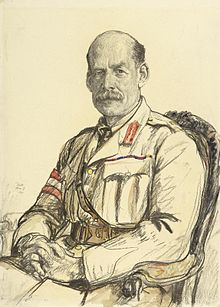|
Arthur Holland (British Army officer)
Lieutenant General Sir Arthur Edward Aveling Holland, KCB, KCMG, DSO, MVO (13 April 1862 – 7 December 1927) was a British Army officer and Conservative and Unionist politician. Military career Born the son of Major General Butcher, Butcher changed his surname to Holland in 1910.[3] Holland was, after graduating from the Royal Military Academy at Woolwich, commissioned into the Royal Artillery in May 1880.[4][5] He served in the Second Boer War and then became Assistant Military Secretary to the Governor and Commander-in-Chief of Malta in 1903 before holding a similar role at the War Office from 1910.[4] In 1912 he was appointed commandant of the Royal Military Academy, Woolwich, for which he was later promoted to the temporary rank of brigadier general in January 1913.[6] He also served in the First World War, which began in the summer of 1914, becoming commander, Royal Artillery (CRA) of the 8th Division,[7] in which capacity he took part in the Battle of Neuve Chapelle in March 1915.[3] In July he became CRA for VII Corps but was only there briefly as in September, after being promoted to the temporary rank of major general,[8] he succeeded Richard Haking as general officer commanding (GOC) of the 1st Division.[3] His major general's rank having been made substantive in January 1916,[9] he continued his war service as CRA for the Third Army from June 1916[10] and as GOC I Corps from February 1917, upon being made a temporary lieutenant-general.[11] He became colonel commandant of the Royal Artillery in October 1919.[12] He retired from the army in March 1920,[13] after his rank of lieutenant-general was made permanent.[4][14] Member of ParliamentHolland was Member of Parliament for Northampton from 1924 until his death in 1927.[4] The consequent by-election for his seat was won by the Labour candidate Cecil Malone. FamilyArthur Holland married Mary Kate Duval; they had one daughter.[3] He died in 1927 and was interred in Greenwich Cemetery.[15] References
External links |
||||||||||||||||||||||||
